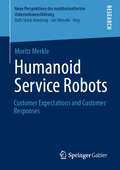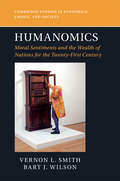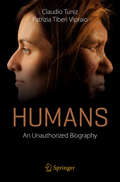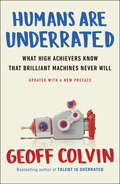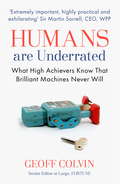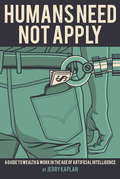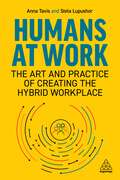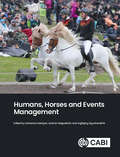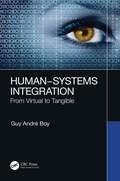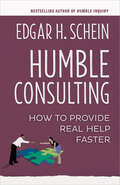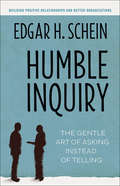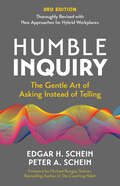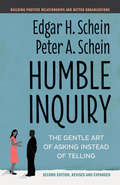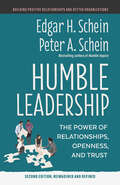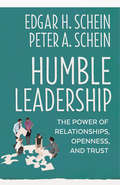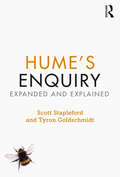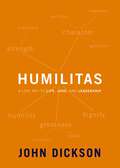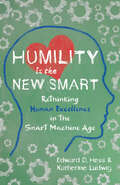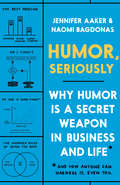- Table View
- List View
Humanoid Service Robots: Customer Expectations and Customer Responses (Neue Perspektiven der marktorientierten Unternehmensführung)
by Moritz MerkleBased on four empirical studies, Moritz Merkle examines the introduction of humanoid robots to the frontline service encounter in a customer-centric approach focusing on customer expectations and customer responses. The author identifies desirable robotic behavioral cues and shows that service robots meet great acceptance among customers. After service failures, customers are even more likely to forgive service robots than human employees. Further, he shows how crucial it is to manage customer expectations that depend on cultural dimensions and internal reference categories.
Humanomics: Moral Sentiments and the Wealth of Nations for the Twenty-First Century (Cambridge Studies in Economics, Choice, and Society)
by Vernon L. Smith Bart J. WilsonWhile neo-classical analysis works well for studying impersonal exchange in markets, it fails to explain why people conduct themselves the way they do in their personal relationships with family, neighbors, and friends. In Humanomics, Nobel Prize-winning economist Vernon L. Smith and his long-time co-author Bart J. Wilson bring their study of economics full circle by returning to the founder of modern economics, Adam Smith. Sometime in the last 250 years, economists lost sight of the full range of human feeling, thinking, and knowing in everyday life. Smith and Wilson show how Adam Smith's model of sociality can re-humanize twenty-first century economics by undergirding it with sentiments, fellow feeling, and a sense of propriety - the stuff of which human relationships are built. Integrating insights from The Theory of Moral Sentiments and the Wealth of Nations into contemporary empirical analysis, this book shapes economic betterment as a science of human beings.
Humans
by Claudio Tuniz Patrizia Tiberi VipraioBased on the latest scientific discoveries, this "unauthorized biography" of the Humans recounts the story of our distant ancestors during the past 6 million years, since the line of our extended family separated from that leading to modern chimpanzees. The book explains how different species evolved, both anatomically and cognitively, and describes the impacts of climatic and environmental change on this process. It also explores the nature of relationships within and between species, describes their everyday lives, and discusses how isolated individuals became members of larger social groups. The concluding chapters highlight the paramount importance of the emergence of symbolic thought and discuss its contribution to the formation of institutions, societies, and economies. The multifaceted picture that emerges will help the reader to make sense not only of "what we were", but also of "what we are", here and now. The book is both entertaining and rigorous in integrating results from a wide selection of disciplines. It will be particularly suitable for people with a curious and open mind, keen to overcome long-standing prejudices on man's place in nature.
Humans Are Underrated: What High Achievers Know That Brilliant Machines Never Will
by Geoff ColvinAs technology races ahead, what will people do better than computers?What hope will there be for us when computers can drive cars better than humans, predict Supreme Court decisions better than legal experts, identify faces, scurry helpfully around offices and factories, even perform some surgeries, all faster, more reliably, and less expensively than people?It’s easy to imagine a nightmare scenario in which computers simply take over most of the tasks that people now get paid to do. While we’ll still need high-level decision makers and computer developers, those tasks won’t keep most working-age people employed or allow their living standard to rise. The unavoidable question—will millions of people lose out, unable to best the machine?—is increasingly dominating business, education, economics, and policy.The bestselling author of Talent Is Overrated explains how the skills the economy values are changing in historic ways. The abilities that will prove most essential to our success are no longer the technical, classroom-taught left-brain skills that economic advances have demanded from workers in the past. Instead, our greatest advantage lies in what we humans are most powerfully driven to do for and with one another, arising from our deepest, most essentially human abilities—empathy, creativity, social sensitivity, storytelling, humor, building relationships, and expressing ourselves with greater power than logic can ever achieve. This is how we create durable value that is not easily replicated by technology—because we’re hardwired to want it from humans.These high-value skills create tremendous competitive advantage—more devoted customers, stronger cultures, breakthrough ideas, and more effective teams. And while many of us regard these abilities as innate traits—“he’s a real people person,” “she’s naturally creative”—it turns out they can all be developed. They’re already being developed in a range of far-sighted organizations, such as: • the Cleveland Clinic, which emphasizes empathy training of doctors and all employees to improve patient outcomes and lower medical costs; • the U.S. Army, which has revolutionized its training to focus on human interaction, leading to stronger teams and greater success in real-world missions; • Stanford Business School, which has overhauled its curriculum to teach interpersonal skills through human-to-human experiences. As technology advances, we shouldn’t focus on beating computers at what they do—we’ll lose that contest. Instead, we must develop our most essential human abilities and teach our kids to value not just technology but also the richness of interpersonal experience. They will be the most valuable people in our world because of it. Colvin proves that to a far greater degree than most of us ever imagined, we already have what it takes to be great.From the Hardcover edition.
Humans Are Underrated: What High Achievers Know that Brilliant Machines Never Will
by Geoff ColvinIn the dawning age of brilliant machines, what will people do better than computers?It's easy to imagine a frightening future in which technology takes over the jobs that we now get paid to do, working more accurately and for barely any cost. Computers can already perform surgery, drive vehicles, write articles and do intricate legal work, so what hope will there be for tomorrow's workforce?Drawing on a wealth of research, Geoff Colvin uncovers the skills that will be in great demand as technology advances - and how they can be developed. In this new machine age, we shouldn't try to beat computers at what they can do. We'll lose that contest. Instead we must look to unlikely places, learn from the best, and cultivate the human abilities that make us unique.
Humans Need Not Apply: A Guide to Wealth & Work in the Age of Artificial Intelligence
by Jerry KaplanAn &“intriguing, insightful&” look at how algorithms and robots could lead to social unrest—and how to avoid it (The Economist, Books of the Year). After decades of effort, researchers are finally cracking the code on artificial intelligence. Society stands on the cusp of unprecedented change, driven by advances in robotics, machine learning, and perception powering systems that rival or exceed human capabilities. Driverless cars, robotic helpers, and intelligent agents that promote our interests have the potential to usher in a new age of affluence and leisure—but as AI expert and Silicon Valley entrepreneur Jerry Kaplan warns, the transition may be protracted and brutal unless we address the two great scourges of the modern developed world: volatile labor markets and income inequality. In Humans Need Not Apply, he proposes innovative, free-market adjustments to our economic system and social policies to avoid an extended period of social turmoil. His timely and accessible analysis of the promises and perils of AI is a must-read for business leaders and policy makers on both sides of the aisle. &“A reminder that AI systems don&’t need red laser eyes to be dangerous.&”—Times Higher Education Supplement &“Kaplan…sidesteps the usual arguments of techno-optimism and dystopia, preferring to go for pragmatic solutions to a shrinking pool of jobs.&”—Financial Times
Humans and Autonomous Vehicles
by Joseph GiacominThis book provides an introduction to the Human Centred Design of autonomous vehicles for professionals and students. While rapid progress is being made in the field of autonomous road vehicles the majority of actions and the research address the technical challenges, with little attention to the physical, perceptual, cognitive and emotional needs of humans. This book fills a gap in the knowledge by providing an easily understandable introduction to the needs and desires of people in relation to autonomous vehicles. The book is "human centred design" led, adding an important human perspective to the primarily technology-driven debates about autonomous vehicles. It combines knowledge from fields ranging from linguistics to electrical engineering to provide a holistic, multidisciplinary overview of the issues affecting the interactions between autonomous vehicles and people. It emphasises the constraints and requirements that a human centred perspective necessitates, giving balanced information about the potential conflicts between technical and human factors. The book provides a helpful introduction to the field of design ethics, to enhance the reader’s awareness and understanding of the multiple ethical issues involved in autonomous vehicle design. Written as an accessible guide for design practitioners and students, this will be a key read for those interested in the psychological, sociological and ethical factors involved in automotive design, human centred design, industrial design and technology.
Humans at Work: The Art and Practice of Creating the Hybrid Workplace
by Anna Tavis Stela LupushorIs your organization strategically prepared for the digital and distributed workplace?Technology, data analytics and artificial intelligence already impact how people work and engage with organizations. A dispersed workforce, greater transparency, social change, generational shift and value chain disruptions are driving new behaviors and expectations from the workplace. Together, these trends are shaping a new era of distributed and digitally enabled network of workers where the work comes to workers instead of the workers going to work. In Humans at Work, employee and workplace experience experts Anna Tavis and Stela Lupushor advocate for the adoption of human-centric practices as a critical and necessary part of adapting work and workplaces to the future of work. Outlining the four factors (digitization of work, distributed workplaces, organizational redesign and changing workforce) driving the dramatic changes in the workplace, each chapter provides examples of how innovative companies are building workplace infrastructure and reshaping norms, serving new markets and adopting new technologies. Filled with examples from both start-ups and established companies, Humans at Work is the workplace leader's guide to building a workplace that creates market value by making work more human.
Humans, Horses and Events Management
by Katherine Dashper Guðrún Helgadóttir Ingibjörg SigurðardóttirHorses are perhaps the most common non-human animal to feature in planned events, but although there is considerable research on equestrian sport, there is virtually none on equestrian events. This book begins to address this gap, using the National Championships of the Icelandic Horse as an extended case study to explain in depth the process of managing an event, as well as the larger theoretical implications of events management. Drawing on diverse viewpoints and theoretical perspectives, the book draws wider comparisons to connect events management to larger themes in the social sciences, such as human-animal relations; nationalism; place branding; event impacts; event experience; and inclusion and exclusion. The book is a contribution to two fields. In relation to human-animal studies, it focuses on how the Icelandic horse breed is marketed and celebrated through top-tier competition; whereas from an events management perspective, it considers the role of the event in community building, the practical and theoretical aspects of running a sustainable equestrian event, and the issues that arise in multispecies event contexts. This book: - Uniquely draws together events management and human-animal studies. - Is formed from empirical research conducted by a multinational team of events management and tourism researchers. - Uses a single, extended case study to explore a range of themes and issues, both empirically and theoretically. A valuable resource for researchers of events management, human-animal studies and tourism, this book also provides an in-depth look at end-to-end events management for industry professionals.
Human–Systems Integration: From Virtual to Tangible
by Guy André BoyHuman–Systems Integration: From Virtual to Tangible Subject Guide: Ergonomics and Human Factors This book is an attempt to better formalize a systemic approach to human–systems integration (HSI). Good HSI is a matter of maturity… it takes time to mature. It takes time for a human being to become autonomous, and then mature! HSI is a matter of human–machine teaming, where human–machine cooperation and coordination are crucial. We cannot think engineering design without considering people and organizations that go with it. We also cannot think new technology, new organizations, and new jobs without considering change management. More specifically, this book is a follow-up of previous contributions in human-centered design and practice in the development of virtual prototypes that requires progressive operational tangibility toward HSI. The book discusses flexibility in design and operations, tangibility of software-intensive systems, virtual human-centered design, increasingly autonomous complex systems, human factors and ergonomics of sociotechnical systems, systems integration, and changed management in digital organizations. The book will be of interest to industry, academia, those involved with systems engineering, human factors, and the broader public.
Humble Consulting: How to Provide Real Help Faster
by Edgar H. ScheinConsulting in Complex and Changing TimesOrganizations face challenges today that are too messy and complicated for consultants to simply play doctor: run a few tests, offer a neat diagnosis of the "problem," and recommend a solution. Edgar Schein argues that consultants have to jettison the old idea of professional distance and work with their clients in a more personal way, emphasizing authentic openness, curiosity, and humility. Schein draws deeply on his own decades of experience, offering over two dozen case studies that illuminate each stage of this humble consulting process. Just as he did with Process Consultation nearly fifty years ago, Schein has once again revolutionized the field, enabling consultants to be more genuinely helpful and vastly more effective.
Humble Decision Making
by Amitai EtzioniOld methods of decision making, such as incrementalism and "rational" decision making don't meet the needs of a world with too much information and too little time. A new model allows one to make decisions with partial information and to adapt to new information as it becomes available. Adaptive or "humble" decision making involves two sets of judgments: broad, basic choices about an organization's goals and policies; and small, experimental decisions based on in-depth examination of a focused subset of facts and choices. Managers can use humble decision making to increase the flexibility and adaptability of their decisions.
Humble Inquiry
by Edgar H. ScheinThe Key to Effective Communication Communication is essential in a healthy organization. But all too often when we interact with people--especially those who report to us--we simply tell them what we think they need to know. This shuts them down. To generate bold new ideas, to avoid disastrous mistakes, to develop agility and flexibility, we need to practice Humble Inquiry. Ed Schein defines Humble Inquiry as "the fine art of drawing someone out, of asking questions to which you do not know the answer, of building a relationship based on curiosity and interest in the other person." In this seminal work, Schein contrasts Humble Inquiry with other kinds of inquiry, shows the benefits Humble Inquiry provides in many different settings, and offers advice on overcoming the cultural, organizational, and psychological barriers that keep us from practicing it.
Humble Inquiry, 3rd Edition: The Gentle Art of Asking Instead of Telling
by Edgar H. Schein Peter A. ScheinThe global bestseller with over 300,000 copies sold returns in its 3rd edition to continue teaching people how to effectively ask and obtain accurate answers to questions across all mediums.With 30% new material, including how to apply humble inquiry while working remotely, this updated edition is the definitive book on bringing humility back into your life.In an increasingly divisive era where communication is often dominated by assertiveness and directive leadership, this bestselling guide offers a refreshing and essential perspective on the power of asking instead of telling. This updated 3rd edition offers practical advice for how to build relationships based on curiosity and foster collaboration and trust between team members.Lessons in this book will help you:•Build healthy relationships with people from different occupational, professional, and national cultures•Create psychologically safe work climates that allow people to feel safe to share what they know•Foster teamwork and bust hyper-competitiveness through open communication, trust, and coordinationIn this new edition, updates have been made to 30% of the book that delves into the fresh challenges inherent in today's workplace, including new stories and case examples as well as an entire additional chapter with a focus on humble inquiry in the context of remote and hybrid work.
Humble Inquiry, Second Edition: The Gentle Art of Asking Instead of Telling
by Edgar H. Schein Peter A. ScheinThis worldwide bestseller offers simple guidance for building the kind of open and trusting relatonships vital for tackling global systemic challenges and developing adaptive, innovative organizations—over 200,000 copies sold and translated into seventeen languages!We live, say Edgar and Peter Schein, in a culture of "tell." All too often we tell others what we think they need to know or should do. But whether we are leading or following, what matters most is we get to the truth. We have to develop a commitment to sharing vital facts and identifying faulty assumptions—it can mean the difference between success and failure. This is why we need Humble Inquiry more than ever. The Scheins define Humble Inquiry as "the gentle art of drawing someone out, of asking questions to which you do not know the answer, of building relationships based on curiosity and interest in the other person." It was inspired by Edgar's twenty years of work in high-hazard industries and the health-care system, where honest communication can literally mean the difference between life and death.In this new edition the authors look at how Humble Inquiry differs from other kinds of inquiry, offer examples of it in action, and show how to overcome the barriers that keep us telling when we should be asking. This edition offers a deepening and broadening of this concept, seeing it as not just a way of posing questions but an entire attitude that includes better listening, better responding to what others are trying to tell us, and better revealing of ourselves. Packed with case examples and a full chapter of exercises and simulations, this is a major contribution to how we see human conversational dynamics and relationships, presented in a compact, personal, and eminently practical way.
Humble Leadership, Second Edition: The Power of Relationships, Openness, and Trust
by Edgar H. Schein Peter A. ScheinDiscover a more agile, democratic, and effective model of leadership, from legendary business scholar Edgar Schein and Silicon Valley executive Peter Schein.Legendary organizational scholar Edgar Schein and former Silicon Valley executive Peter Schein say leadership today requires that people transcend their hierarchical roles and relate to each other as human beings-what they call humble leadership. In such relationships new ideas can flow freely, mistakes can come to light immediately, and course corrections can be made in real time rather than by committee or by order of the lone heroic CEO.This second edition includes three new chapters. Chapter 1 zeros-in on the Schein's actionable definition of leadership-relative to management and administration-focused on leading people toward new and better. Chapter 2 introduces the concept of situational humility-leaders now need to shift between several types of relationships to deal with the accelerating complexity of a supply-constrained, quiet-quitting, and two-days-in-the-office world. And Chapter 5 explains how to create a culture of humble leadership. Illustrated with examples from healthcare, government, the military, tech, and more, this is a compact, accessible guide to a leadership paradigm far better suited to a world that demands fast, nimble response to change, and a workplace hungry for mutual respect and trust.
Humble Leadership: The Power of Relationships, Openness, and Trust
by Edgar H. Schein Peter A. ScheinThe Future of LeadershipLeadership is a relationship—but that relationship must change, say legendary organizational scholar Edgar Schein and former Silicon Valley executive Peter Schein. The vertical hierarchy, with its emphasis on formal, transactional relationships, professional distance, and all guidance coming from the top, is hopelessly inflexible and outdated. In a complex world, leadership must rely on high levels of trust and openness throughout the organization, and that can be achieved only by what they call personization and Level 2 relationships, which build the agility to make course corrections quickly. This book shows how such humble leadership has built effective cultures in a whole range of sectors: health care, government, the military, tech and innovation, and more.
Hume's Enquiry: Expanded and Explained
by David Hume Tyron Goldschmidt Scott StaplefordHume’s Enquiry: Expanded and Explained includes the entire classical text of David Hume’s An Enquiry Concerning Human Understanding in bold font, a running commentary blended seamlessly into the text in regular font, and analytic summaries of each section. The commentary is like a professor on hand to guide the reader through every line of the daunting prose and every move in the intricate argumentation. The unique design helps students learn how to read and engage with one of modern philosophy’s most important and exciting classics. Key Features: Includes the entire original text. Provides helpful summaries of each paragraph. Offers commentary on every line of text. Removes the gap between commentary and text.
Humilitas: A Lost Key to Life, Love, and Leadership
by John DicksonHumility, or holding power loosely for the sake of others, is sorely lacking in today’s world. Without it, many people fail to develop their true leadership potential and miss out on genuine fulfillment in their lives and their relationships. Humilitas: A Lost Key to Life, Love, and Leadership shows how the virtue of humility can turn your strengths into true greatness in all areas of life. Through the lessons of history, business, and the social sciences, author John Dickson shows that humility is not low self-esteem, groveling, or losing our distinct gifts. Instead, humility both recognizes our inherent worth and seeks to use whatever power we have at our disposal on behalf of others. Some of the world’s most inspiring and influential players have been people of immense humility. The more we learn about humility, the more we understand how essential it is to a satisfying career and personal life. By embracing this virtue, we will transform for good the unique contributions we each make to the world.
Humility Is the New Smart: Rethinking Human Excellence in the Smart Machine Age
by Edward D. Hess Katherine LudwigSmart machines are replacing more and more jobs. Edward Hess and Katherine Ludwig show how to develop abilities that machines don't have so we can thrive in this Smart Machine Age. Underlying them all is a sense of personal humility: honestly recognizing our limitations and working to mitigate them. In nearly every industry, smart machines are replacing human labor. It's not just factory jobs-automated technologies are handling people's investments, diagnosing illnesses, and analyzing written documents. If we humans are going to endure, Edward Hess and Katherine Ludwig say we're going to need a dose of humility. We need to be humble enough to let go of the idea that smart means knowing the most, using that information quickest, and making the fewest mistakes. Smart machines will always be better than we are at those things. Instead, we need to cultivate important abilities that smart machines don't have (yet): thinking critically, creatively, and innovatively and building close relationships with others so we can collaborate effectively. Hess and Ludwig call this being NewSmart. To develop these abilities, we need to practice four specific behaviors: keeping our egos out of our way, managing our thoughts and emotions to curb any biases or defensiveness, listening to others with an open mind, and connecting with others socially and emotionally. What all these behaviors have in common is, again, humility-avoiding self-centeredness so we can learn from and work with other humans. Hess and Ludwig offer a guide to developing these NewSmart abilities and to creating organizations where these qualities are encouraged and rewarded.
Humor im Arbeitskontext: Über den Einsatz von konstruktivem und destruktivem Humor in der Arbeitswelt
by Sebastian HausendorfHumor ist allgegenwärtig, auch in der Arbeitswelt. Mitarbeiter teilen Humor, witzeln über ihren Chef, bringen durch Humor eventuell auch Abneigung und Distanz zu anderen Kollegen und zum Arbeitgeber zum Ausdruck. Der Grat zwischen Humor und Mobbing ist oft schmal. Dieses Buch beleuchtet die positiven Effekte von Humor im Arbeitskontext, behandelt aber auch seine negativen Seiten. Der Autor widmet sich auf durchdachte Weise diesem vielgestaltigen und komplexen menschlichen Phänomen, das in allen Kulturen vorkommt. Humor kann die Stimmung auflockern und das Verhältnis zwischen Kollegen sowie zwischen Führungskräften und Mitarbeitern stärken. Wenn jemand Witze auf Kosten von Kollegen macht, wird aus Spaß jedoch schnell Ernst und manche Kollegen fühlen sich persönlich angegriffen. Lesen Sie, worauf gerade auch Führungskräfte achten sollten und erfahren Sie, ob man Humor trainieren kann und wie sich Humor „managen“ lässt.
Humor ist Chefsache: Besser führen, verhandeln und präsentieren – so entwickeln Sie Ihren humorvollen Fingerabdruck
by Eva UllmannMit diesem Buch können Sie als Chef Ihren persönlichen Humorstil entdecken, trainieren und bewusst einsetzen.Humor gehört in jeden guten Handwerkskoffer einer Führungskraft. Es ist ein Instrument, um Aufmerksamkeit zu bekommen, eine Stimmungslage zu verändern oder Spannungen abzubauen. Viele Menschen wünschen sich, Inhalte mit mehr Humor gut verpacken zu können. Wer ein Händchen für Humor entwickelt, hat einen klaren Vorteil, sei es in der Mitarbeiterführung, einer Verhandlung, einer Präsentation, in einer Krisensituation oder beim Small Talk – egal ob als Arzt oder Ingenieur, als Top-Manager oder Kommunalpolitiker, als Teamleiter oder Projektmanager.Dieses Buch wird Ihnen Lust machen, Ihren noch schlummernden Humor zu entdecken, zu schärfen und noch geschickter einzusetzen. Ihr Gewinn: mehr Erfolg und Gelassenheit in Ihrem anspruchsvollen Alltag als Führungskraft. Humor und Schlagfertigkeit kann man üben. Eva Ullmann zeigt Ihnen wie.Aus dem InhaltHumor, was ist das? Und welcher Humortyp sind Sie?Humor in der Präsentation, im Vertrieb, in der Verhandlung, im Mitarbeitergespräch, im Konflikt, in Transformations-prozessen, in der PersonalarbeitMit zehn Humortechniken Humor situativ einsetzenSo sehen Führungskräfte Humor im Führungsalltag„Humor gezielt anzuwenden, ist ein Werkzeug, das umso ehrlicher rüberkommt, wenn man es nicht manipulativ einsetzt. Wenn es eine spielerische Note hat, dann findet es auch Akzeptanz.“Klaus-Peter Hansen, Vorsitzender der Geschäftsführung der Regionaldirektion Sachsen, Bundesagentur für Arbeit„Es gibt diesen wunderbaren Satz eines amerikanischen Kollegen: `Wenn du den Humor in den Dingen erkennst, dann überlebst du sie.´“René Borbonus, Spezialist für berufliche Kommunikation, Präsentation und Rhetorik„Für mich ist es eine Basistugend, Humor in den Alltag zu integrieren. Es darf nicht peinlich werden. Es darf nicht albern wirken. Es darf nie verletzend werden oder jemanden vorführen.“Marc Raschke, Leiter der Unternehmenskommunikation des Klinikums Dortmund„Wie kommen wir auf Ideen? Eigentlich sind es immer tagesaktuelle Themen.“Frank Büch, Head of Marketing der Berliner Verkehrsbetriebe (BVG) „Humor sorgt dafür, dass man sich noch mehr konzentriert, weil es noch spannender wird.“ Reza Razavi, Change- und Transformationsberater der BMW Group München„Als technischer Experte bekommt man mehr Humor in seine Themen, indem man sich selbst nicht so ernst nimmt. Alle wissen schließlich, dass man Experte ist. Man muss also nicht unbedingt unnahbar sein, um als Experte zu wirken.“Tobias Schrödel, „Deutschlands erster IT- Comedian“ (Chip) erklärt IT-technische Systemlücken und Zusammenhänge für jeden verständlich und lässt dabei den Spaß nicht zu kurz kommen„Ich denke, es ist wichtig, zum richtigen Zeitpunkt den Humor auch ein Stück zurückzunehmen und ganz klare Grenzen zu setzen.“Sören Hammermüller, Regionalleiter Süd-Ost bei der Deutschen Fachpflege und Geschäftsführer des Heimbeatmungsservices Brambring Jaschke GmbH„Der Zweck von Humortechniken ist es nicht, dass man sich an der Definition aufhängt, sondern dass man einen zuverlässigen Ort findet, wohin man gehen kann, wenn man einen Witz braucht, und zwar sofort.“ John Vorhaus, Comedy-Altmeister mit jahrelanger Hollywood-Erfahrung (er schreibt u.a. für Serien wie „Wunderbare Jahre“ und „Eine schrecklich nette Familie“ Al Bundy) Mit einem kurzen Überblick über die aktuelle Humorforschung von Prof. Dr. Tabea Scheel, Professorin für Arbeits- und Organisationspsychologie an der Europa-Universität Flensburg
Humor ist Chefsache: Besser führen, verhandeln und präsentieren – so entwickeln Sie Ihren humorvollen Fingerabdruck
by Eva UllmannMit diesem Buch können Sie als Führungskraft Ihren persönlichen Humorstil entdecken, trainieren und bewusst einsetzen. Humor gehört in jeden guten Handwerkskoffer einer Führungskraft. Es ist ein Instrument, um Aufmerksamkeit zu bekommen, eine Stimmungslage zu verändern oder Spannungen abzubauen. Wer ein Händchen für Humor entwickelt, hat einen klaren Vorteil, sei es in der Mitarbeiterführung, einer Verhandlung, einer Präsentation, in einer Krisensituation oder beim Small Talk – egal ob als Arzt oder Ingenieur, als Top-Manager oder Kommunalpolitiker, als Teamleiter oder Projektmanager.Dieses Buch wird Ihnen Lust machen, Ihren noch schlummernden Humor zu entdecken, zu schärfen und noch geschickter einzusetzen. Ihr Gewinn: mehr Erfolg und Gelassenheit in Ihrem anspruchsvollen Alltag als Führungskraft. Humor und Schlagfertigkeit kann man üben. Eva Ullmann zeigt Ihnen wie. Die Neuauflage ist aktueller, kürzer und witziger. Ergänzt wurde der Humor in Online Meetings, im Change-Prozess und in der Kommunikation mit sich selbst. Aus dem InhaltHumor, was ist das? Und welcher Humortyp sind Sie?Humor in der Präsentation, im Vertrieb, in der Verhandlung, im Mitarbeitergespräch, im Konflikt, in Transformationsprozessen, in der Personalarbeit.Humor in humorlosen Zeiten: darf man bei Pandemie, Krieg und Inflation eigentlich noch lachen?Mit zehn Humortechniken Humor situativ einsetzen.So sehen Führungskräfte Humor im Führungsalltag„Humor gezielt anzuwenden, ist ein Werkzeug, das umso ehrlicher rüberkommt, wenn man es nicht manipulativ einsetzt. Wenn es eine spielerische Note hat, dann findet es auch Akzeptanz.“Klaus-Peter Hansen, Vorsitzender der Geschäftsführung der Regionaldirektion Sachsen, Bundesagentur für Arbeit„Es gibt diesen wunderbaren Satz eines amerikanischen Kollegen: `Wenn du den Humor in den Dingen erkennst, dann überlebst du sie.´“René Borbonus, Spezialist für berufliche Kommunikation, Präsentation und Rhetorik„Für mich ist es eine Basistugend, Humor in den Alltag zu integrieren. Es darf nicht peinlich werden. Es darf nicht albern wirken. Es darf nie verletzend werden oder jemanden vorführen.“Marc Raschke, Leiter der Unternehmenskommunikation des Klinikums Dortmund„Sich selbst nicht so ernst nehmen, hilft fast immer.“Frank Büch, Head of Marketing der Berliner Verkehrsbetriebe (BVG)„Als technischer Experte bekommt man mehr Humor in seine Themen, indem man sich selbst nicht so ernst nimmt. Alle wissen schließlich, dass man Experte ist. Man muss also nicht unbedingt unnahbar sein, um als Experte zu wirken.“Tobias Schrödel, „Deutschlands erster IT- Comedian“ (Chip) erklärt IT-technische Systemlücken und Zusammenhänge für jeden verständlich und lässt dabei den Spaß nicht zu kurz kommen„Nur weil ich einen bestimmten Humor habe, bin ich überhaupt erst zur Führungskraft geworden.“Sören Hammermüller, COO des Gesamtkonzerns (DeutscheFachpflege) sowie Leitung der Geschäftsführung der Bonitas Pflegegruppe„Der Zweck von Humortechniken ist es nicht, dass man sich an der Definition aufhängt, sondern dass man einen zuverlässigen Ort findet, wohin man gehen kann, wenn man einen Witz braucht, und zwar sofort.“ John Vorhaus, Comedy-Altmeister mit jahrelanger Hollywood-Erfahrung (er schreibt u.a. für Serien wie „Wunderbare Jahre“ und „Eine schrecklich nette Familie“ Al Bundy) Mit einem kurzen Überblick über die aktuelle Humorforschung von Prof. Dr. Tabea Scheel, Profe
Humor or Harassment? (HBR Case Study and Commentary)
by Michael Page Dianne Bevelander Jacqueline NolanHBR Case Study
Humor, Seriously: Why Humor Is a Secret Weapon in Business and Life (And how anyone can harness it. Even you.)
by Jennifer Aaker Naomi BagdonasAnyone—even you!—can learn how to harness the power of humor in business (and life), based on the popular class at Stanford's Graduate School of Business. &“The ultimate guide to using the magical power of funny as a tool for leadership and a force for good.&”—Daniel H. Pink, #1 New York Times bestselling author of When and DriveThere exists a mistaken belief in today&’s corporate world: that we have to be serious all the time in order to be taken seriously. But the research tells a different story: that humor can be one of the most powerful tools we have for accomplishing serious things. Studies show that humor makes us appear more competent and confident, strengthens relationships, unlocks creativity, and boosts our resilience during difficult times. Plus, it fends off a permanent and unsightly frown known as &“resting boss face.&”Top executives are in on the secret: 98 percent prefer employees with a sense of humor, and 84 percent believe that these employees do better work. But even for those who intuitively understand humor&’s power, few know how to wield it with intention. As a result, humor is vastly underleveraged in most workplaces today, impacting our performance, relationships, and health.That&’s why Jennifer Aaker and Naomi Bagdonas teach the popular course Humor: Serious Business at the Stanford Graduate School of Business, where they help some of the world&’s most hard-driving, blazer-wearing business minds build levity into their organizations and lives. In Humor, Seriously, they draw on findings by behavioral scientists, world-class comedians, and inspiring business leaders to reveal how humor works and—more important—how you can use more of it, better.Aaker and Bagdonas unpack the theory and application of humor: what makes something funny and how to mine your life for material. They show how to use humor to make a strong first impression, deliver difficult feedback, persuade and motivate others, and foster cultures where levity and creativity can thrive—not to mention, how to keep it appropriate and recover if you cross a line.President Dwight David Eisenhower once said, &“A sense of humor is part of the art of leadership, of getting along with people, of getting things done.&” If Dwight David Eisenhower, the second least naturally funny president ever (after Franklin Pierce), thought humor was necessary to win wars, build highways, and warn against the military-industrial complex, then you might consider learning it too.Seriously.
